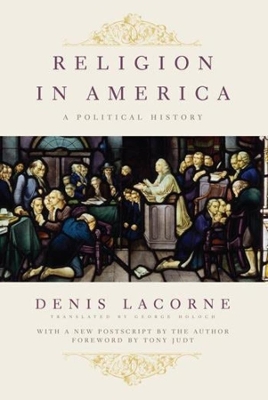Religion, Culture, and Public Life
2 primary works
Book 7
Denis Lacorne identifies two competing narratives defining the American identity. The first narrative, derived from the philosophy of the Enlightenment, is essentially secular. Associated with the Founding Fathers and reflected in the Declaration of Independence, the Constitution, and the Federalist Papers, this line of reasoning is predicated on separating religion from politics to preserve political freedom from an overpowering church. Prominent thinkers such as Voltaire, Thomas Paine, and Jean-Nicolas Demeunier, who viewed the American project as a radical attempt to create a new regime free from religion and the weight of ancient history, embraced this American effort to establish a genuine "wall of separation" between church and state. The second narrative is based on the premise that religion is a fundamental part of the American identity and emphasizes the importance of the original settlement of America by New England Puritans. This alternative vision was elaborated by Whig politicians and Romantic historians in the first half of the nineteenth century. It is still shared by modern political scientists such as Samuel Huntington.
These thinkers insist America possesses a core, stable "Creed" mixing Protestant and republican values. Lacorne outlines the role of religion in the making of these narratives and examines, against this backdrop, how key historians, philosophers, novelists, and intellectuals situate religion in American politics.
These thinkers insist America possesses a core, stable "Creed" mixing Protestant and republican values. Lacorne outlines the role of religion in the making of these narratives and examines, against this backdrop, how key historians, philosophers, novelists, and intellectuals situate religion in American politics.
Book 38
The modern notion of tolerance—the welcoming of diversity as a force for the common good—emerged in the Enlightenment in the wake of centuries of religious wars. First elaborated by philosophers such as John Locke and Voltaire, religious tolerance gradually gained ground in Europe and North America. But with the resurgence of fanaticism and terrorism, religious tolerance is increasingly being challenged by frightened publics.
In this book, Denis Lacorne traces the emergence of the modern notion of religious tolerance in order to rethink how we should respond to its contemporary tensions. In a wide-ranging argument that spans the Ottoman Empire, the Venetian republic, and recent controversies such as France’s burqa ban and the white-supremacist rally in Charlottesville, The Limits of Tolerance probes crucial questions: Should we impose limits on freedom of expression in the name of human dignity or decency? Should we accept religious symbols in the public square? Can we tolerate the intolerant? While acknowledging that tolerance can never be entirely without limits, Lacorne defends the Enlightenment concept against recent attempts to circumscribe it, arguing that without it a pluralistic society cannot survive. Awarded the Prix Montyon by the Académie Française, The Limits of Tolerance is a powerful reflection on twenty-first-century democracy’s most fundamental challenges.
In this book, Denis Lacorne traces the emergence of the modern notion of religious tolerance in order to rethink how we should respond to its contemporary tensions. In a wide-ranging argument that spans the Ottoman Empire, the Venetian republic, and recent controversies such as France’s burqa ban and the white-supremacist rally in Charlottesville, The Limits of Tolerance probes crucial questions: Should we impose limits on freedom of expression in the name of human dignity or decency? Should we accept religious symbols in the public square? Can we tolerate the intolerant? While acknowledging that tolerance can never be entirely without limits, Lacorne defends the Enlightenment concept against recent attempts to circumscribe it, arguing that without it a pluralistic society cannot survive. Awarded the Prix Montyon by the Académie Française, The Limits of Tolerance is a powerful reflection on twenty-first-century democracy’s most fundamental challenges.

